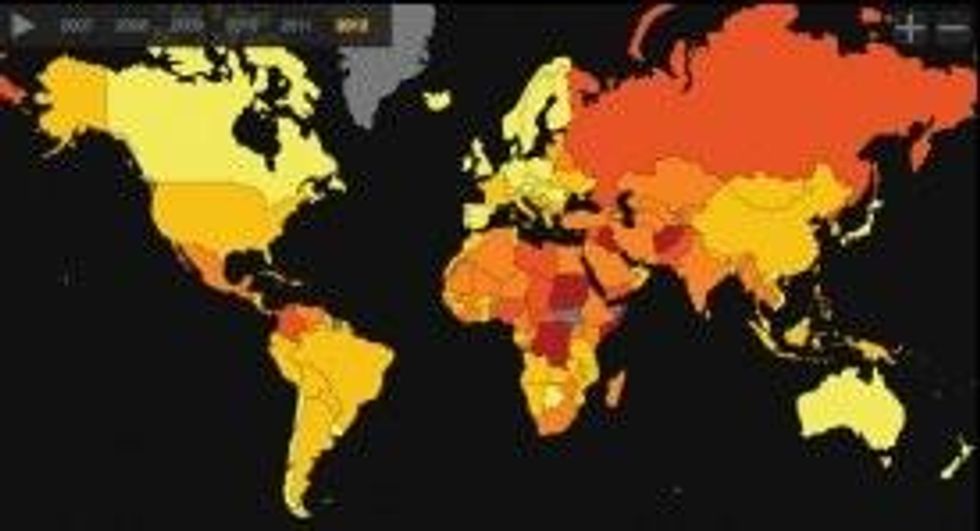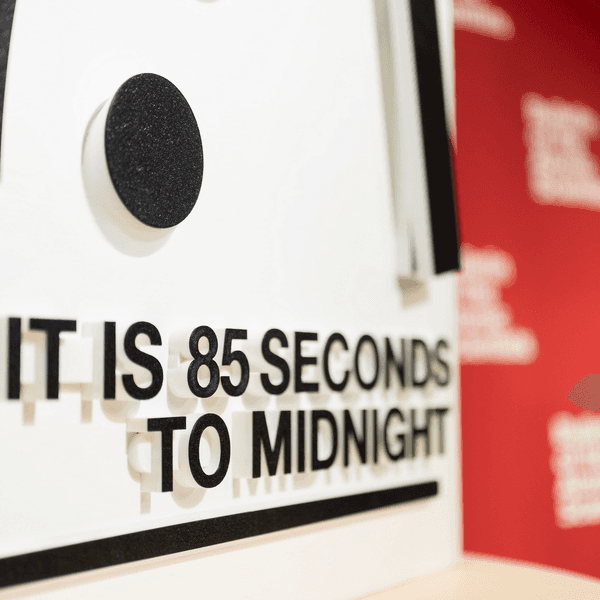We're Number 88! We're Number 88! US Ranked Low on Global Peace Index
2012 Global Peace Index shows slightly more peaceful world from 2009
The just released 2012 Global Peace Index (GPI) from the Institute for Economics and Peace shows that the world has become slightly more peaceful over the last two years, with Iceland ranking as the most peaceful country and Somalia ranking as the least peaceful place. The U.S. ranks 88 of 158.

The index takes into account factors including jailed population, political instability, conflicts fought and military expenditure.
"What comes across dramatically in this year's results and the six year trends is a shift in global priorities. Nations have become externally more peaceful as they compete through economic, rather than military means. The results for Sub Saharan Africa as a whole are particularly striking - regional wars have waned as the African Union strives to develop economic and political integration." said Steve Killelea, founder and Executive Chairman of the Institute for Economics and Peace (IEP).
"Peacefulness has returned to approximately the levels seen in 2007, but while external measures of peacefulness have improved, there has been a rise in internal conflict. This is particularly noticeable in the rise in fatalities from terrorist acts which have more than trebled since 2003," states Killelea.
The findings also highlight the fact that peace has an economic advantage. The IEP estimates that global peace in 2011 would have had an economic benefit of $9 trillion.
* * *
Video uploaded by Vision of Humanity with highlights of the 2012 Global Peace Index
* * *
10 Most Peaceful Countries
| Rank | Country |
| 1 | Iceland |
| 2 | Denmark |
| 2 | New Zealand |
| 4 | Canada |
| 5 | Japan |
| 6 | Austria |
| 6 | Ireland |
| 8 | Slovenia |
| 9 | Finland |
| 10 | Switzerland |
10 Least Peaceful Countries
| Rank | Country |
| 158 | Somalia |
| 157 | Afghanistan |
| 156 | Sudan |
| 155 | Iraq |
| 154 | Dem. Republic of Congo |
| 153 | Russia |
| 152 | North Korea |
| 151 | Central African Republic |
| 150 | Israel |
| 149 | Pakistan |
* * *
Global Peace Index: Key Findings
- Iceland is the most peaceful country for the second successive year
- Syria tumbles by the largest margin, dropping over 30 places to 147th position.
- Somalia remains the world's least peaceful nation for the second year running.
- End of civil war sees Sri Lanka as biggest riser, leaping nearly 30 places
- If the world had been completely peaceful in 2011, the economic benefit would have been an estimated US $9 trillion
An Urgent Message From Our Co-Founder
Dear Common Dreams reader, The U.S. is on a fast track to authoritarianism like nothing I've ever seen. Meanwhile, corporate news outlets are utterly capitulating to Trump, twisting their coverage to avoid drawing his ire while lining up to stuff cash in his pockets. That's why I believe that Common Dreams is doing the best and most consequential reporting that we've ever done. Our small but mighty team is a progressive reporting powerhouse, covering the news every day that the corporate media never will. Our mission has always been simple: To inform. To inspire. And to ignite change for the common good. Now here's the key piece that I want all our readers to understand: None of this would be possible without your financial support. That's not just some fundraising cliche. It's the absolute and literal truth. We don't accept corporate advertising and never will. We don't have a paywall because we don't think people should be blocked from critical news based on their ability to pay. Everything we do is funded by the donations of readers like you. Will you donate now to help power the nonprofit, independent reporting of Common Dreams? Thank you for being a vital member of our community. Together, we can keep independent journalism alive when it’s needed most. - Craig Brown, Co-founder |
The just released 2012 Global Peace Index (GPI) from the Institute for Economics and Peace shows that the world has become slightly more peaceful over the last two years, with Iceland ranking as the most peaceful country and Somalia ranking as the least peaceful place. The U.S. ranks 88 of 158.

The index takes into account factors including jailed population, political instability, conflicts fought and military expenditure.
"What comes across dramatically in this year's results and the six year trends is a shift in global priorities. Nations have become externally more peaceful as they compete through economic, rather than military means. The results for Sub Saharan Africa as a whole are particularly striking - regional wars have waned as the African Union strives to develop economic and political integration." said Steve Killelea, founder and Executive Chairman of the Institute for Economics and Peace (IEP).
"Peacefulness has returned to approximately the levels seen in 2007, but while external measures of peacefulness have improved, there has been a rise in internal conflict. This is particularly noticeable in the rise in fatalities from terrorist acts which have more than trebled since 2003," states Killelea.
The findings also highlight the fact that peace has an economic advantage. The IEP estimates that global peace in 2011 would have had an economic benefit of $9 trillion.
* * *
Video uploaded by Vision of Humanity with highlights of the 2012 Global Peace Index
* * *
10 Most Peaceful Countries
| Rank | Country |
| 1 | Iceland |
| 2 | Denmark |
| 2 | New Zealand |
| 4 | Canada |
| 5 | Japan |
| 6 | Austria |
| 6 | Ireland |
| 8 | Slovenia |
| 9 | Finland |
| 10 | Switzerland |
10 Least Peaceful Countries
| Rank | Country |
| 158 | Somalia |
| 157 | Afghanistan |
| 156 | Sudan |
| 155 | Iraq |
| 154 | Dem. Republic of Congo |
| 153 | Russia |
| 152 | North Korea |
| 151 | Central African Republic |
| 150 | Israel |
| 149 | Pakistan |
* * *
Global Peace Index: Key Findings
- Iceland is the most peaceful country for the second successive year
- Syria tumbles by the largest margin, dropping over 30 places to 147th position.
- Somalia remains the world's least peaceful nation for the second year running.
- End of civil war sees Sri Lanka as biggest riser, leaping nearly 30 places
- If the world had been completely peaceful in 2011, the economic benefit would have been an estimated US $9 trillion
The just released 2012 Global Peace Index (GPI) from the Institute for Economics and Peace shows that the world has become slightly more peaceful over the last two years, with Iceland ranking as the most peaceful country and Somalia ranking as the least peaceful place. The U.S. ranks 88 of 158.

The index takes into account factors including jailed population, political instability, conflicts fought and military expenditure.
"What comes across dramatically in this year's results and the six year trends is a shift in global priorities. Nations have become externally more peaceful as they compete through economic, rather than military means. The results for Sub Saharan Africa as a whole are particularly striking - regional wars have waned as the African Union strives to develop economic and political integration." said Steve Killelea, founder and Executive Chairman of the Institute for Economics and Peace (IEP).
"Peacefulness has returned to approximately the levels seen in 2007, but while external measures of peacefulness have improved, there has been a rise in internal conflict. This is particularly noticeable in the rise in fatalities from terrorist acts which have more than trebled since 2003," states Killelea.
The findings also highlight the fact that peace has an economic advantage. The IEP estimates that global peace in 2011 would have had an economic benefit of $9 trillion.
* * *
Video uploaded by Vision of Humanity with highlights of the 2012 Global Peace Index
* * *
10 Most Peaceful Countries
| Rank | Country |
| 1 | Iceland |
| 2 | Denmark |
| 2 | New Zealand |
| 4 | Canada |
| 5 | Japan |
| 6 | Austria |
| 6 | Ireland |
| 8 | Slovenia |
| 9 | Finland |
| 10 | Switzerland |
10 Least Peaceful Countries
| Rank | Country |
| 158 | Somalia |
| 157 | Afghanistan |
| 156 | Sudan |
| 155 | Iraq |
| 154 | Dem. Republic of Congo |
| 153 | Russia |
| 152 | North Korea |
| 151 | Central African Republic |
| 150 | Israel |
| 149 | Pakistan |
* * *
Global Peace Index: Key Findings
- Iceland is the most peaceful country for the second successive year
- Syria tumbles by the largest margin, dropping over 30 places to 147th position.
- Somalia remains the world's least peaceful nation for the second year running.
- End of civil war sees Sri Lanka as biggest riser, leaping nearly 30 places
- If the world had been completely peaceful in 2011, the economic benefit would have been an estimated US $9 trillion

